The Hindu Editorial (Winter is coming) – Oct 13, 2022
The International Monetary Fund (IMF), in its latest World Economic Outlook report, has retained global growth hopes for 2022 at 3.2%, and lowered next year’s projection to 2.7% from 2.9%. For further reading, visit “The Hindu”. Below is today’s word list-1 for The Hindu Editorial (Winter is coming) – Oct 13, 2022.
To read this article, click “The Hindu”.
This preview is provided here with permission.
Courtesy: The Hindu
The Hindu Editorial (Winter is coming) – Oct 13, 2022:
- winter is coming (phrase) – a threatening warning/sign that something bad/unpleasant is going to happen.
- International Monetary Fund (IMF) (noun) – an international organization of 189 countries, headquartered in Washington, D.C., working to foster global monetary cooperation, secure financial stability, facilitate international trade, promote high employment and sustainable economic growth, and reduce poverty around the world.
- amid (preposition) – in the middle of, surrounded by; during.
- impulse (noun) – impetus, fillip, spur, motivation, encouragement.
- the best/worst is yet to come (phrase) – the most pleasant/unpleasant or favourable/unfavourable thing has not happenned yet (and that may happen in the future).
- World Economic Outlook (WEO) (noun) – A Survey by the IMF staff usually published twice a year in the months of April and October. It presents IMF staff economists’ analyses of global economic developments during the near and medium term.
- projection (noun) – forecast, prediction, indication, calculation, prognosis, speculation (of future events or trends).
- recession (noun) – economic decline, slowdown, downturn, depression, slump.
- monetary policy (noun) – monetary policy refers to the use of monetary instruments under the control of the central bank to regulate magnitudes such as interest rates, money supply, and availability of credit with a view to achieving the ultimate objective of economic policy mentioned in the Reserve Bank of India Act, 1934.
- curb (verb) – control, moderate, mitigate, reduce, lessen.
- stubbornly (adverb) – persistently, firmly, inflexibly.
- inflation (noun) – simply meaning “cost of living”; increase of price level of goods & services and vice versa decrease of currency value.
- spiralling (adjective) – increasing continuously & dramatically.
- slash (verb) – reduce, lower, bring down.
- forecast (noun) – prediction, indication, projection, prognosis, speculation, calculation (of future events or trends).
- World Bank (noun) – The World Bank is an international development organization owned by 187 countries. Its role is to reduce poverty by lending money to the governments of its poorer members to improve their economies and to improve the standard of living of their people. The World Bank was established in 1944 to help rebuild Europe and Japan after World War II. Its official name was the International Bank for Reconstruction and Development (IBRD).
- peg (verb) – fix, set, hold, limit (a price, rate, or amount) at a particular level.
- Gross domestic product (GDP) (noun) – a measure of economic activity in a country. It is the total value of a country’s annual output of goods and services.
- South & North Block (noun) – South Block is a metonym of the Prime Minister’s Office. North Block is a metonym of the Ministry of Finance, India. (The Secretariat Building (consists North & South Block) or Central Secretariat is where the Cabinet Secretariat is housed, which administers the Government of India. The South Block houses the Prime Minister’s Office, Ministry of Defence, and the Ministry of External Affairs). The North Block primarily houses the Ministry of Finance and the Home Ministry). (Metonym is used as an alternative for something else with which it is closely related/associated).
- mandarin (noun) – a powerful officer, public/government servant, office-bearer, civil servant.
- downgrade (noun) – decline, downfall, degeneration.
- attribute (verb) – ascribe, connect with, associate with; hold responsible for.
- out-turn (noun) – return; result (growth achieved in a specific period, instead of what was expected).
- quarter (noun) – a period of three months (considered as one-fourth of a year).
- subdued (adjective) – low, lowered, inactive, dull; restrained, controlled.
- back (verb) – support, favour, promote, endorse, defend.
- prognosis (noun) – forecast, prediction, projection, speculation, calculation (of future events or trends).
- the road ahead (noun) – the future.
- render (verb) – make, cause to become.
- tortuous (adjective) – complicated, complex, indirect, lengthy.
- lingering (adjective) – long-drawn-out, protracted, prolonged, persisting.
- conflict (noun) – war, armed conflict, battle, fighting.
- slowdown (noun) – economic decline, recession, downturn, depression, slump.
- eloquently (adverb) – expressively, revealingly, significantly, indicatively.
- fiscal (adjective) – financial.
- miscalibration (noun) – misassessment, incorrect assessment; false evaluation.
- growing (adjective) – increasing.
- uncertainty (noun) – unpredictability, unreliability, riskiness/precariousness.
- fragility (noun) – vulnerability, riskiness; weakness, delicacy.
- emphasise (verb) – underscore, highlight, stress, call/draw attention to, put stress on.
- tag (noun) – label, name, identity, identification, recognition.
- Nomura (noun) – a global financial services group with an integrated network spanning over 30 countries and regions. By connecting markets East & West, they service the needs of individuals, institutions, corporates and governments through our three business divisions: Retail, Wholesale (Global Markets and Investment Banking) and Investment Management.
- optimism (noun) – hopefulness, hope, confidence, positive attitude, buoyancy.
- prospects (noun) – chances, possibilities, expectations, outlook, future.
- misplaced (adjective) – misguided, misconceived, ill-advised, ill-considered, ill-judged.
- downturn (noun) – recession, economic decline, slowdown, depression, slump.
- ripple effect/domino effect/knock-on effect (noun) – an event (or a process/action) that causes several other events to happen indirectly one after the other; secondary/indirect effect, consequence/implication, chain of events.
- slip (verb) – fall, sink, drop, go down, decrease.
- relative (adjective) – comparative, respective, comparable, correlative, parallel, corresponding.
- prosperity (noun) – success, fortune, welfare, well being.
- suffice (verb) – be enough, be sufficient, be adequate.
- faltering (adjective) – delaying, uncertain, unsteady/weak, precarious, irresolute, hesitant.
- pre-pandemic (noun) – before the pandemic.
- pandemic (noun) – the worldwide spread of a new disease; The illness spreads around the world and typically affects a large number of people across a wide area.
- trajectory (noun) – track/course, route, path, direction, approach.
- inclusive (adjective) – all-round, overall.
- constitute (verb) – make up, comprise, form, compose, represent.
- demographic (adjective) – the statistical study/structure of populations, especially human beings.
- demographic dividend (noun) – it is defined as a boost in economic productivity that occurs when there are growing numbers of people in the workforce relative to the number of dependents (or) it is the accelerated development that can arise when a population has a relatively large proportion of working-age people coupled with effective human capital investment.
- window (noun) – opportunity, chance, opening.
- cash in on (phrasal verb) – use, utilize, exploit, take advantage of, turn to one’s advantage.
- sweet spot (noun) – any place that is favourable for getting a certain desirable effect/result; an optimum spot.
- moreover (adverb) – in addition, furthermore, further.
- given (preposition) – considering, taking into account, bearing in mind.
- per capita (adverb & adjective) – per person, for each; relating to each person.
- sustained (adjective) – continuous, constant, steady.
- surge (noun) – sudden increase or rise of something.
- hit (verb) – affect badly.
- household (noun) – family, house.
- cramp (verb) – hinder, impede, inhibit.
- assertion (noun) – declaration, statement, contention.
- rein in (phrasal verb) – to control, restrain, restrict, limit someone/something.
- premature (adjective) – untimely, early, too soon, too early, before time; ill-timed, ill-considered.
- witness (verb) – show, demonstrate.
- resurgence (noun) – reoccurrence/recurrence, reappearance, reemergence.
- navigate (verb) – handle, manage.
- deftly (adverb) – cleverly, proficiently, skillfully.
Note:
1. Click each one of the words above for their definition, more synonyms, pronunciation, example sentences, phrases, derivatives, origin and etc from http://www.oxforddictionaries.com/.
2. Definitions (elementary level) & Synonyms provided for the words above are my personal work and not that of Oxford University Press. Tentative definitions/meanings are provided for study purpose only and they may vary in a different context.
3. This word list is for personal use only. Reproduction in any format and/or Commercial use of it is/are strictly prohibited.
The Hindu Editorial (Winter is coming) – Oct 13, 2022:
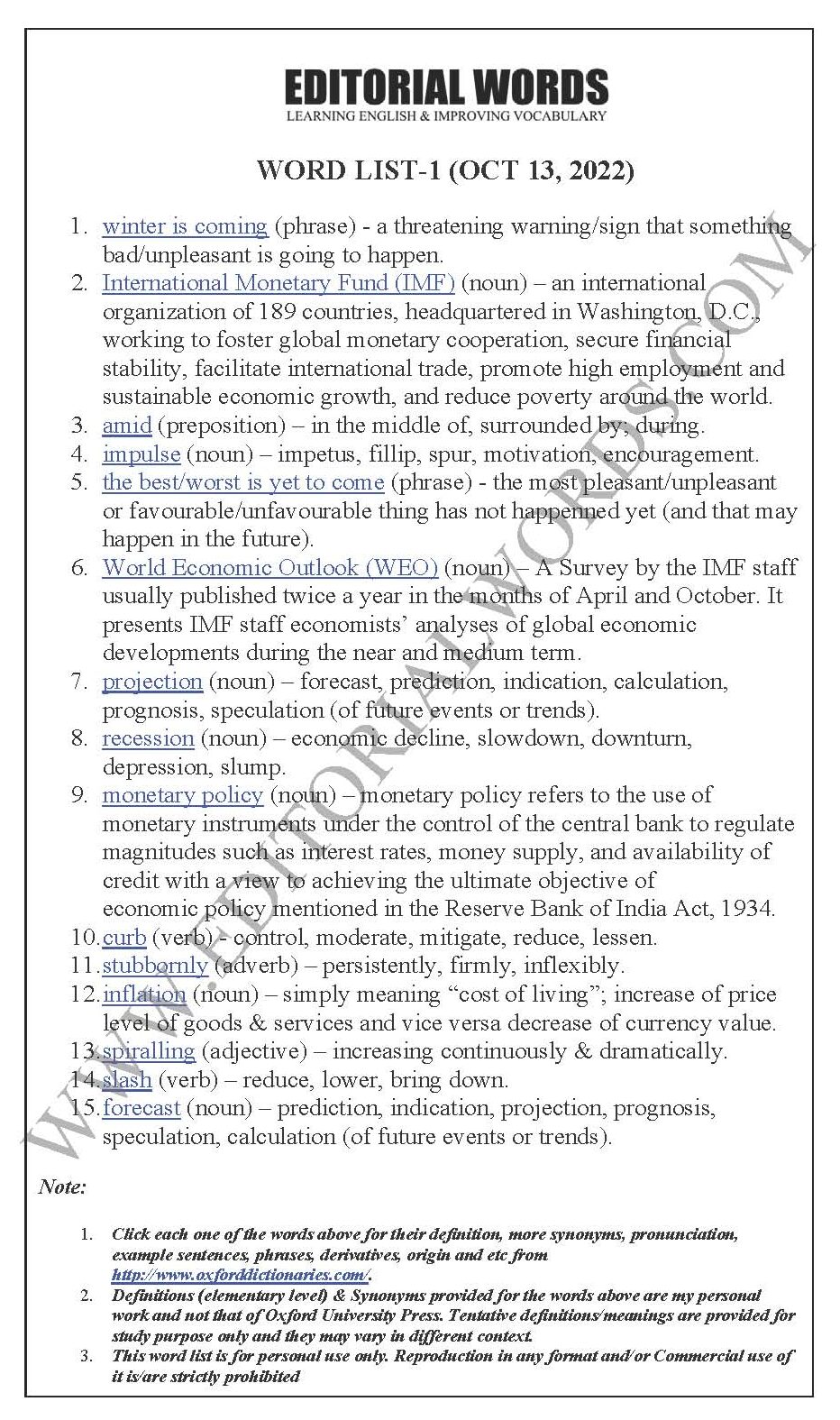
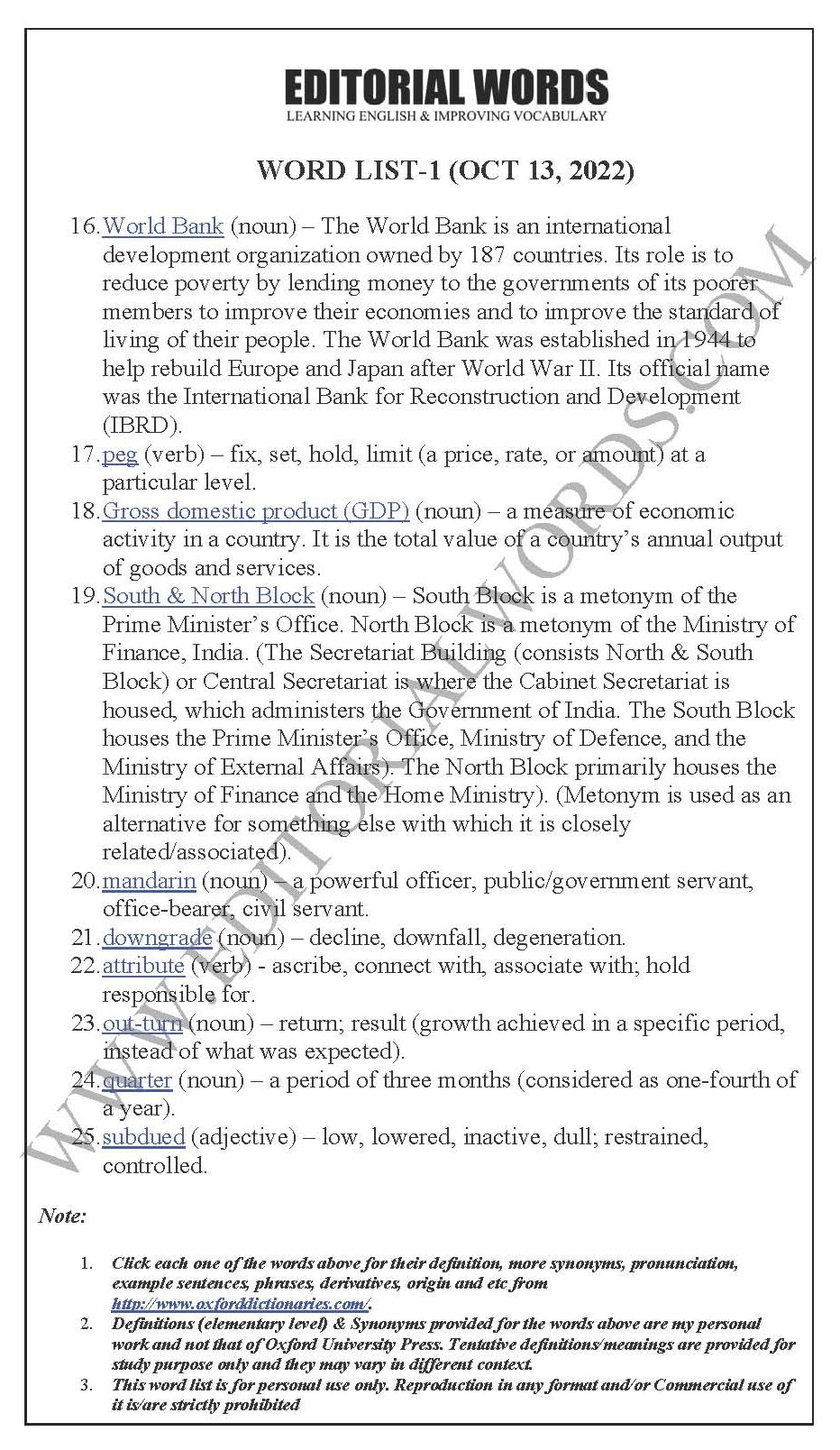
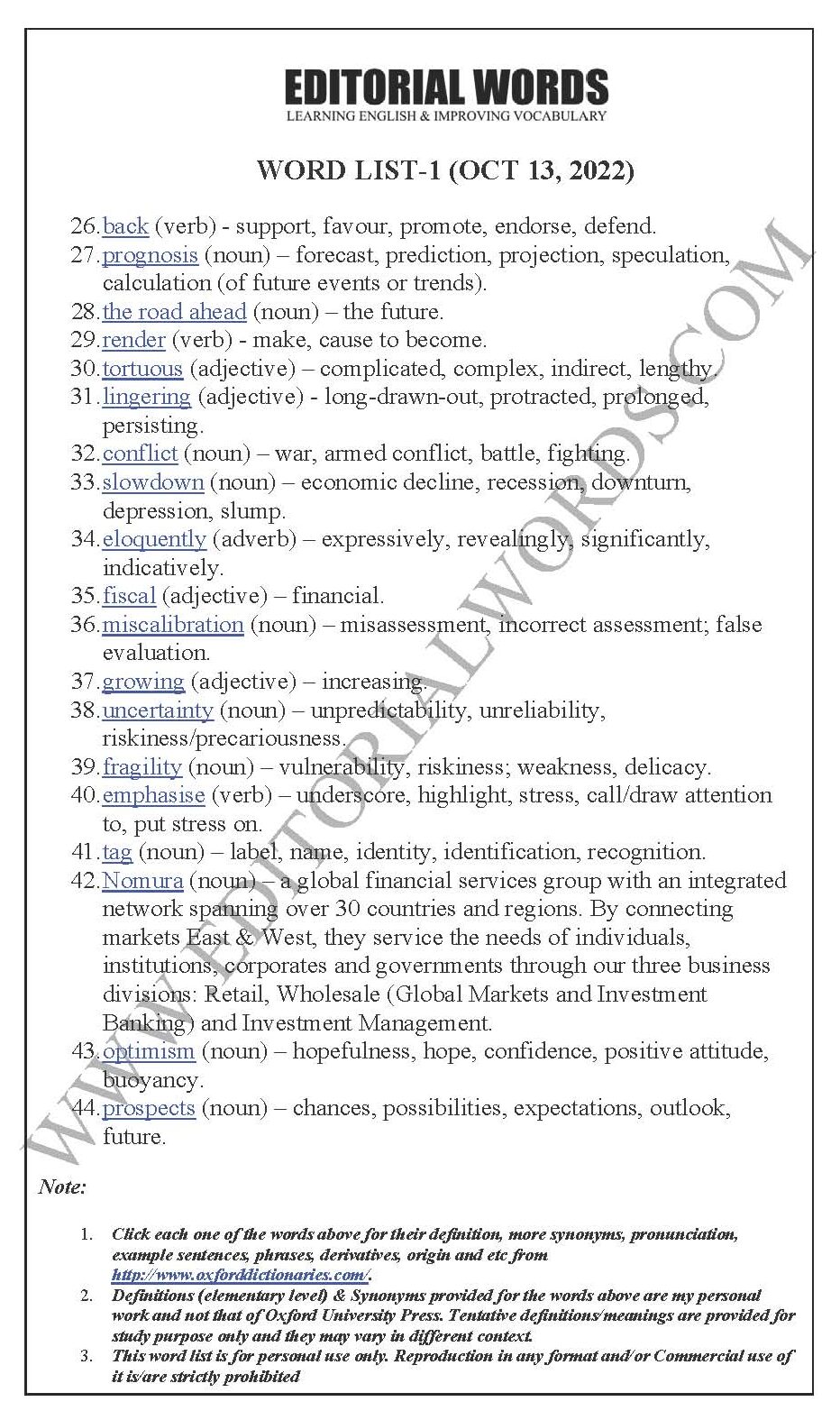
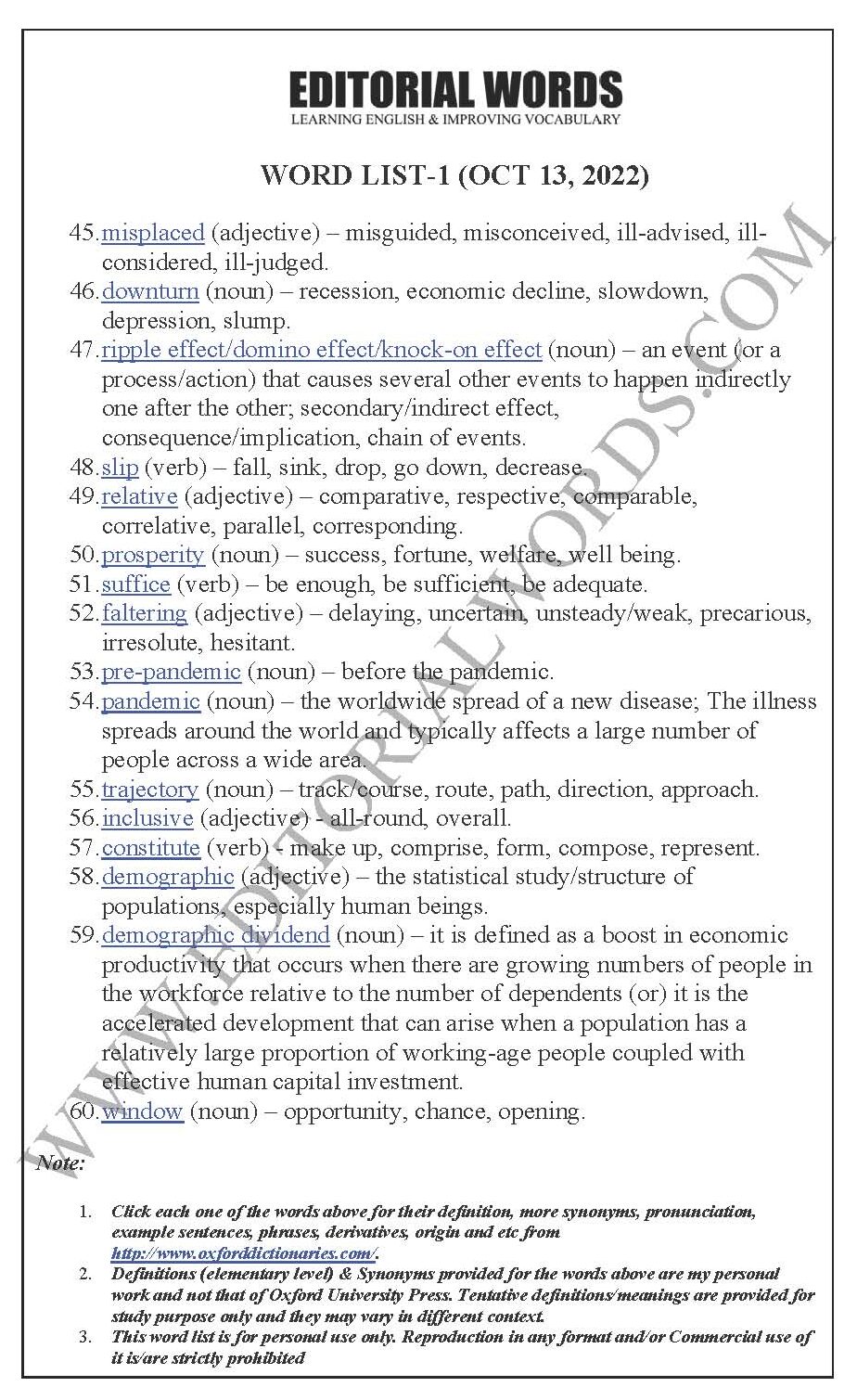
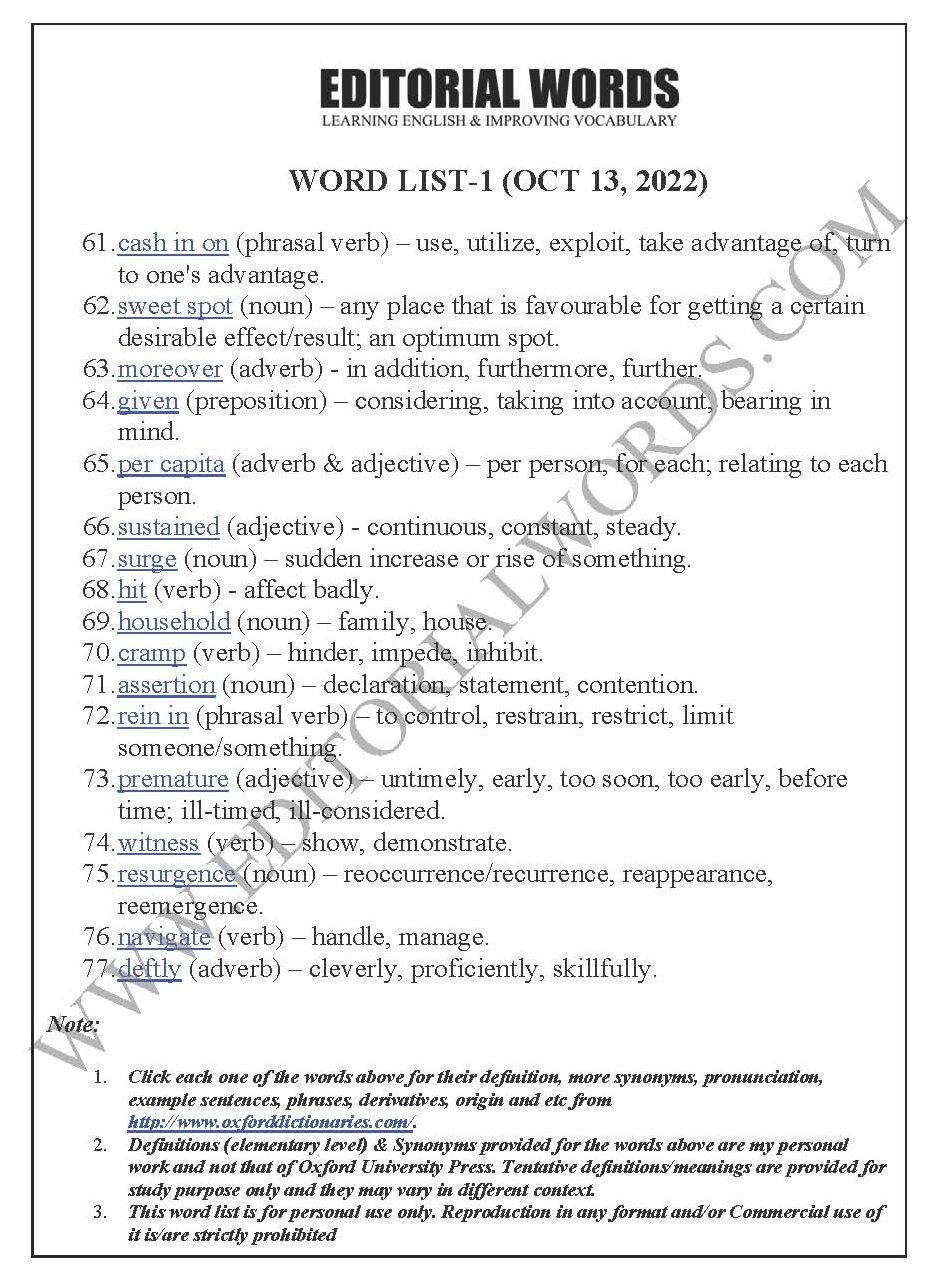
“Phrasal Verbs” We Learnt Last Week
“Idioms & Phrases” We Learnt Last Week
“Important Definitions” We Learnt Last Week
Recent Word Lists For The Hindu Editorial Articles

Be the first to comment